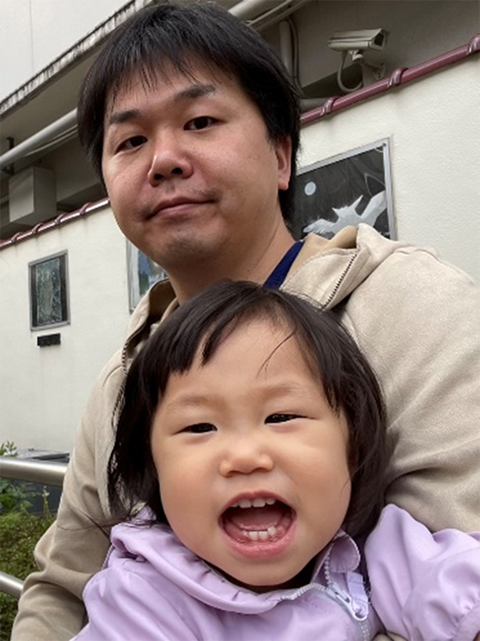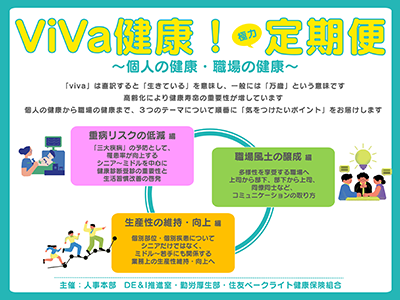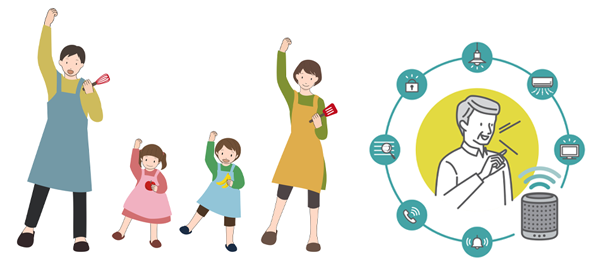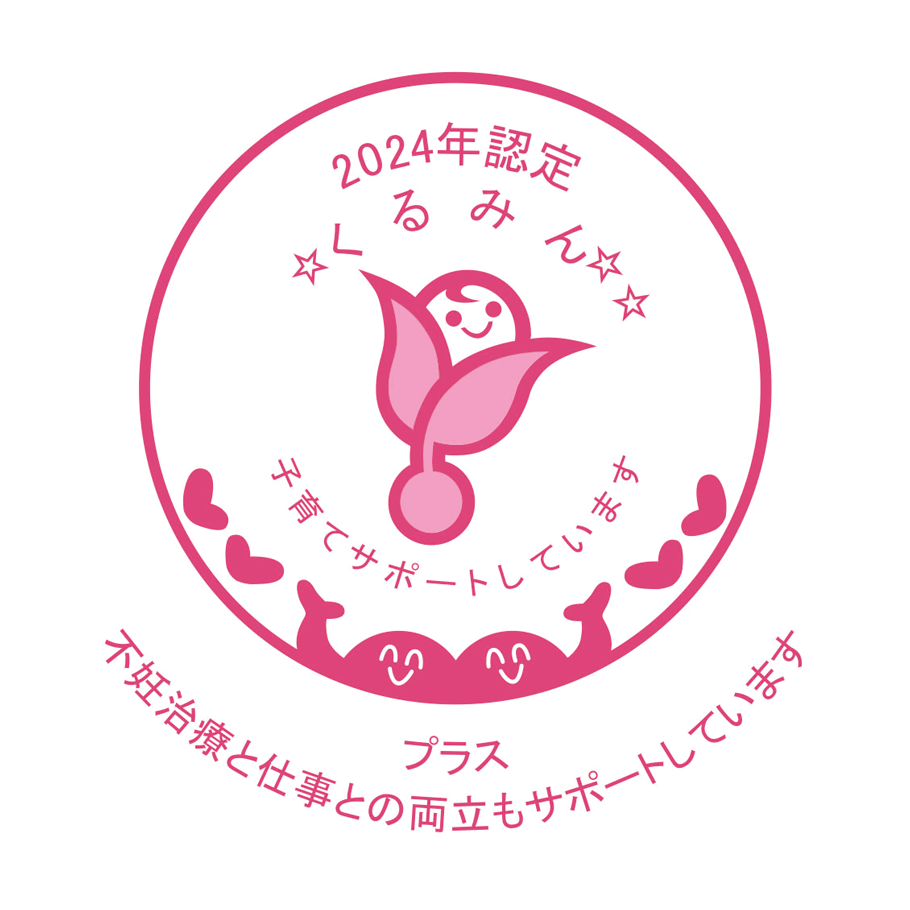Our Position on Work-Life Balance
- (1) To promote flexible approaches to work, while also reducing overtime hours and promoting the full use of annual leave entitlements, and encourage employees to devote the additional time available to worthwhile non-work activities, such as educational pursuits and activities related to family and communities.
- (2) To offer a greater diversity of working styles that benefit employees who must deal with major life events, such as marriage, childbirth, and child rearing, and thus contribute to nurturing the next generation. We are deliberating and phasing in policies that will be effective in achieving these goals.
We are deliberating and phasing in policies that will be effective in achieving these goals.
We are focusing on expanding leave systems, and from June 1, 2023, the number of days of annual paid leave was increased, with the number of days granted increased from eight days to 14 days for employees hired from April, and from 15 days to 20 days for second-year hires (by calendar year)—20 days will be granted for each subsequent year.
In October 2023, we established a new infertility treatment leave system, thereby supporting flexible work styles by allowing employees to take leave in one-day or 10-minute increments. For employees who meet certain conditions, the maximum number of telecommuting days they may work from home has been increased (from eight days to 12 days) to facilitate more efficient work styles. We will continue to implement such initiatives as part of efforts to further promote better work-life balance.
Number of Overtime Hours Worked and Days of Paid Leave Taken by Regular Employees
| Fiscal 2019 | Fiscal 2020 | Fiscal 2021 | Fiscal 2022 | Fiscal 2023 | |
|---|---|---|---|---|---|
| Average number of overtime hours (per annum) | 131.0 | 102.8 | 121.9 | 117.0 | 103.2 |
| Average number of days of paid leave used | 14.4 | 12.6 | 12.9 | 15.1 | 15.0 |
- * “Regular employees” means our company (non-consolidated basis) personnel working during daytime hours, excluding managerial personnel.
Employee Support for Various Life Events
We are focusing on creating an environment in which our employees can achieve their goals for both work and life events (such as childbirth and childcare). We are also encouraging employees to proactively utilize various programs provided by our Group to help them deal with important life events, and since the implementation of childcare leave and nursing care leave programs, the proportion of employees returning to work after taking childcare or nursing leave has been almost 100%. The number of people who took childcare leave in fiscal 2023 came to five women and 19 men, while one female employee took nursing care leave. We will continue to implement initiatives that exceed the specifications of legal standards in order to enhance employee support.
Male employees taking childcare leave
Male employees taking childcare leave
We provide the first five days with pay (100%) under the “Childcare Leave at Birth,” newly created new following the amendment to the law in October 2022.
We are working to create a workplace environment where male employees are more flexible to take leave by providing education on balancing work and childcare, and through activities to raise awareness such as feedback from male employees who have taken such leave.
In fiscal 2023, 65.5% of male employees took childcare leave, which was a significant increase of 25.9% over the previous fiscal year. We will continue making further improvements going forward.

- * Registered as a company or organization supporting “childcare leave” being promoted by the Tokyo Metropolitan Government’s Kodomo Smile Movement. This movement runs educational and awareness activities that can help foster a social culture where anyone, regardless of gender, is able to take childcare leave if necessary.
Feedback from a person who took leave system to support life events
Parental leave boosted my family ties and allowed me to develop as a person
We had our first child in January 2023, and I took childcare leave for a year and three months before returning to work in April 2024. While I did feel a little anxious about leaving my workplace for such a long period of time, I made the decision after being warmly encouraged by everyone in my department, who told me: “This will be the only chance you can spend such precious time with your baby, so go ahead and spend time with your family.” Men taking this much time off work for childcare is still quite rare in society today, and my relatives, friends and acquaintances I have met through childbirth and childcare have expressed their surprised, and commented that it is wonderful that my company is so understanding when it comes to childcare.
While the actual child-rearing process was more challenging than I had ever imagined, I was able to watch my child grow everyday—from rolling over, crawling, and walking while holding onto something, to actually starting to walk. Meanwhile, I feel that I have acquired new perspectives, gained insights, and learned lessons during child-rearing, and my wife and I grew closer as we worked together as parents.
Since I returned to work, I have been working shorter hours and completing my duties within the limited time available, while also sharing childcare duties with my wife who has also resumed working again. My child is now going to nursery school, and although every day is still hectic when they come down with an illness all of a sudden, I am seeking to achieve a better work-life balance while also making use of my holidays and telecommuting.

Mr. Kido, Corporate General Affairs & Legal Affairs Department, General Affairs Division
Information Dissemination and Consultation Services
<Publication of Handbook>
We have published a handbook that outlines the key points about balancing work and private life.
- Support for balancing career and childcare (for female employees, male employees, and supervisors)
- Support for balancing work and nursing care
<Establishment of Consultation Services>
We have introduced a consultation service staffed by specialists, to create an environment where employees are able to work with peace of mind while raising children or caring for family members.
- Nursing care consultation
- Healthy lifestyle consultation (pediatrics, obstetrics & gynecology)
Education and Information Dissemination
<Dissemination of Health Information>
We are disseminating information on illnesses and the appropriate responses to be taken due to gender differences, things to be aware of as people age and information on creating a workplace environment where diverse human resources are able to play an active role.
- Streaming videos related to health (male and female versions)
- ViVa Health! Regular service as much as possible (Reducing the Risk of Serious Illnesses, Maintaining and Improving Productivity, Fostering a Workplace Culture)

ViVa Health! Regular service as much as possible
<Tips on Achieving Work-Life Balance>
We called on employees to share some “Tips on Achieving Work-Life Balance” that they use for achieving and maintaining their own work-life balance, and showcasing them on our portal site. Discover specific know-how regarding how to balance work with childcare, nursing care and illnesses.
- Balancing work with childcare: using appliances, family cooperation, etc.
- Balancing work with nursing care: creation of smart homes, home-based nursing care meals, etc.
- Balancing work with illnesses: mail order of foods, etc.


Kurumin Plus Certification
We received Kurumin Plus certification in recognition of its efforts to balance child-rearing and work, as well as its efforts to support fertility treatment.
In fiscal 2023, in order to foster a culture where male employees can take childcare leave, Kurumin provided education to support balancing child-rearing and work, and introduced the voices of those involved. In addition, in order to create an environment where employees can continue to work with peace of mind while undergoing fertility treatment, Kurumin established a leave system for infertility treatment, and worked to promote understanding among superiors and colleagues in the workplace through e-learning.

Next-generation Certification Mark: “Kurumin Plus”
* Kurumin Plus Certification
“Kurumin” is a governmental scheme sponsored by the Minister of Health, Labour and Welfare where, based on the Act on Advancement of Measures to Support Raising Next-Generation Children, a company whose childcare support measures have satisfied a certain criteria can be recognized by the Minister as a “Childcare Supporting Business.”
Various systems supporting employment
Programs Relating to Childbirth and Childcare
| Systems Beyond Those Legally Required | Details |
|---|---|
| Childcare leave after birth system | To encourage male employees to take childcare leave, the first five days of leave are provided with pay (100%) (within 8 weeks after birth of their child). |
| It can be taken separately from childcare leave. | Childcare leave can be taken until children reach the age of 2 |
| Altering work start times for workers caring for children | Employees are able to shift their work start time in 30-minute increments up to either one hour forward or one hour back (employees with children in the sixth grade at elementary school) |
| Shorter working hours | Employees may shorten their prescribed daily working hours by up to 2 hours (employees with children up to the sixth grade of elementary school) (can be used with flex-time) |
| Child nursing Care leave | Leave is up to 5 days per year for one child, and up to 10 days per year for 2 or more children Taken in addition to annual paid leave and nursing absence (employees with children up to the sixth grade of elementary school) 1. A child is injured or is infected with a contagious disease 2. A child requires a vaccination, checkup It can be taken with accumulated annual paid leave |
| Outpatient leave | ・Pregnant employees can take leave during pregnancy and after giving birth for receiving health guidance from a health professional or receiving postnatal checkups It can be taken with accumulated annual paid leave |
- Childbirth leave, exemption from overtime work, limitations on overtime work, and limitations on late-night work, shall remain as legally required.
Programs Relating to Nursing
| Systems Beyond Those Legally Required | Details |
|---|---|
| Nursing leave programs | The total leave period is one year, and may be taken in up to three installments. |
| Change of work start time | Employees are able to shift their work start time in 30-minute increments up to either one hour forward or one hour back |
| Shorter working hours for nursing | Employees may shorten their prescribed daily working hours by up to 2 hours (can be used with flex-time) |
| Nursing leave | ・Nursing leave can be taken in half-day increments up to 5 days per year when there is one family member requiring care or up to 10 days when there are two or more family members requiring care It can be taken with accumulated annual paid leave |
- Exemption from overtime work, limitations on overtime work, and limitations on late-night work, shall remain as legally required.
Programs Relating to Infertility Treatment and Contributing to Ease of Working
| Systems Beyond Those Legally Required | Details |
|---|---|
| Infertility treatment leave | Employees can take 5 days a year in 10-minute increments It can be taken with accumulated annual paid leave |
| Telecommuting system | Employees may work at home up to 8 days per month The following employees may work up to 12 days per month.
|
| Accumulated annual paid leave | It can be used in the following cases
|
| F leave | Female employees who have difficulty working due to menstruation days and PMS (premenstrual syndrome) are eligible, with two days of vacation allowance per month |
- Hourly annual leave system and flextime system are also available

